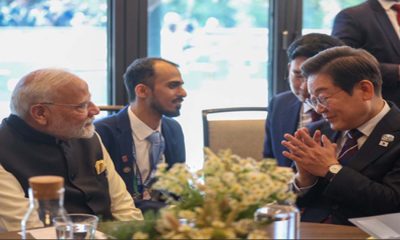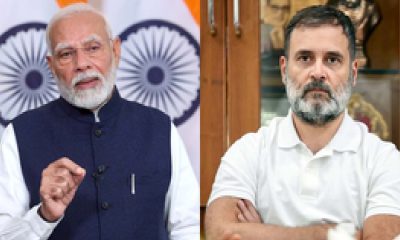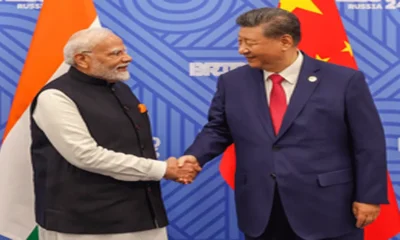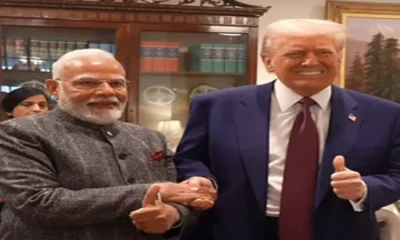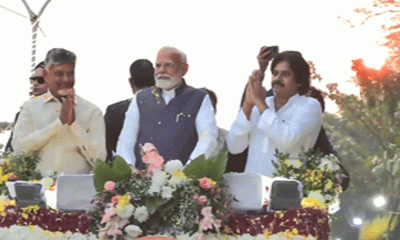National News
Vax drive needs ‘Har Ghar Dastak’ approach to achieve target: PM Modi

Prime Minister Narendra Modi on Wednesday said the vaccination drive against Covid-19 needs a ‘Har Ghar Dastak’ approach to achieve its target.
“So far you have been working to take people to vaccination centres, now it is time to reach every house for door-to-door vaccine. You can take help of local religious leaders to spread awareness about Covid vaccines and to fight rumours,” PM Modi told District Magistrates of low vaccination coverage districts during a review meeting.
A total of 40 low vaccination coverage districts have been identified across Arunachal Pradesh, Assam, Chhattisgarh, Delhi, Haryana, Jharkhand, Maharashtra, Manipur, Meghalaya, Mizoram, Nagaland and Tamil Nadu.
The Chief Ministers of these states were also present at the meeting.
The meeting was held via video conferencing and included districts with less than 50 per cent coverage of the first dose and low coverage of the second dose of Covid-19 vaccine.
Launching the new vaccination campaign ‘Har Ghar Dastak, Modi said: “We have showcased our capabilities under the ‘Sabko Vaccine, Muft Vaccine’, now its time to make ‘Har Ghar Dastak’ campaign successful.”
The Prime Minister asked the officials to change gear from arrangements made for taking people to the vaccination centre to administering vaccines door to door.
He urged the health workers to reach every house with ‘Har Ghar Tika, Ghar Ghar Tika’ – vaccine at every doorstep.
“With the mantra of ‘Har Ghar Dastak’, knock on every door, every household lacking the security net of a double dose of vaccine will be approached,” he said.
The Prime Minister thanked the Chief Ministers for participating in the meeting, and said that their attention towards the vaccination numbers will encourage the district officials to achieve the target.
Modi said in this biggest pandemic of the century, the country faced many challenges.
He said “one special thing in the country’s fight against corona was that we found new solutions and tried innovative methods.”
He urged the administrators to work more on new innovative ways to increase vaccination in their districts. He said that even the better performing districts faced similar challenges, but they were met with determination and innovation.
He asked the officials to develop micro strategies, keeping in mind the experience so far to go for saturation vaccination by addressing the gaps at the local level.
The Prime Minister asked the officials to make different strategies for each village, each town in the district, if need be.
He suggested this can be done by forming a team of 20-25 people depending on the region.
Modi also suggested trying to have a healthy competition in the teams formed.
Exhorting the officials to prepare region-wise timetables for local goals, the Prime Minister said: “You will have to do your best to take your districts nearer the national average.”
He added, “One must never underestimate disease and enemies. They have to be fought till the very end. So, I would want that we should not show even the slightest laxity.”
The Prime Minister said the officials present in the meeting should pay equal attention to the second dose along with the first one.
The Prime Minister emphasised that under the Free Vaccine for All campaign, India created a record of administering about 2.5 crore vaccine doses in a day.
He asked the officials to learn from the good practices of their colleagues in the better performing districts and emphasised that approaches suitable for the local needs and the environment should be adopted.
Business
New labour codes bring on board gig workers with 90-day employment

New Delhi, Jan 2: The Ministry of Labour and Employment has published the draft rules for the four labour codes, which also bring gig workers on board for various benefits such as minimum wage, health, occupational safety, and social security coverage.
The government has invited feedback from stakeholders on these draft rules and aims to finally roll out the entire package of four labour codes across the country from April 1.
Under the draft rules, in order to be eligible for the benefits, a gig or platform worker must be associated with an aggregator for at least 90 days in a financial year to qualify for social security benefits created by the Centre. If a worker is engaged with more than one aggregator, the minimum requirement is fixed at 120 days.
The notification, dated December 30, 2025, was issued a day before the gig and platform workers went on a flash strike for higher wages and better working conditions.
The rules clarify that a worker is considered “engaged” on any calendar day if they earn income for work done for an aggregator, regardless of how much they earn.
If a worker is associated with multiple aggregators, the number of engagement days will be added together across all aggregators. The draft also states that if a worker is engaged with three aggregators on the same calendar day, it will be counted as three separate days of engagement.
Regarding the minimum wage, the draft rules state that when the rate of wages for a day is fixed, then such amount shall be divided by eight for fixing the rate of wages for an hour and multiplied by twenty-six for fixing the rate of wages for a month. In case of a five-day working week, the hourly rate of minimum wages so calculated shall be used to derive the minimum wages for the day.
While fixing the minimum rates of wages, the Central government shall take into account the geographical area, experience in the area of employment, and level of skill required for working under the categories of unskilled, semiskilled, skilled, and highly skilled, the rules further state.
The four codes — the Code on Wages, 2019; the Industrial Relations Code, 2020; the Code on Social Security, 2020; and the Occupational Safety, Health and Working Conditions Code, 2020 — were notified on the same day.
The Labour Codes make it mandatory for employers to issue appointment letters to all workers, which provides written proof to ensure transparency, job security, and fixed employment. Earlier, no mandatory appointment letters were required.
Under the Code on Social Security, 2020, all workers, including gig and platform workers, will get social security coverage. All workers will get PF, ESIC, insurance, and other social security benefits. Earlier, there was only limited security coverage.
Under the Code on Wages, 2019, all workers will receive a statutory minimum wage payment, and timely payment will ensure financial security. Earlier, minimum wages applied only to scheduled industries or employments and large sections of workers remained uncovered.
National News
‘How Does It Matter…’: AIMIM’s Waris Pathan Reacts To KKR Signing Bangladesh’s Mustafizur Rahman In IPL Auction.

Mumbai: With political controversy erupting over Kolkata Knight Riders (KKR) selecting Bangladeshi fast bowler Mustafizur Rahman for the upcoming Indian Premier League (IPL) 2026 season, AIMIM national spokesperson Waris Pathan pointed out that earlier the Indian government had permitted India–Pakistan cricket matches despite strained relations. “When it comes to cricket, how does it matter who supports what?” Pathan said
Though Pathan condemned the atrocities against Hindus in Bangladesh, he added that earlier India suffered greatly due to terrorism, yet matches were still played for commercial reasons.
“We had objected to it because Pakistan has been the biggest propagator of terrorism, and India has greatly suffered because of it… In Pahalgam, they came and killed innocent tourists in the name of religion. India still played a match against Pakistan for money.”
Speaking of his stand on the current KKR selecting Bangladeshi player, Pathan said, “I reject money that puts my country’s pride and dignity into question.”
Shiv Sena leader Sanjay Nirupam urged actor and KKR co-owner Shah Rukh Khan to reconsider the decision, arguing that removing the Bangladeshi player would be “for his own good” and in the interest of the country.
He claimed that with public anger directed at Bangladesh over recent developments, any association with Bangladeshi nationals could provoke backlash.
“When the entire country is enraged and angry at Bangladesh, anyone in India who has even the slightest connection to Bangladeshis could become a target of that anger,” he added.
India and Bangladesh share long-standing diplomatic, cultural and economic ties, with cooperation across trade, connectivity, and security. However, the relationship has seen periods of strain in recent times due to political developments and security concerns in the region. There have been instances of violence against Hindus in the country in recent times.
National News
BMC Polls 2026: MNCDF Releases 30-Point Citizen Charter, Calls For Accountable Civic Governance

With the BMC elections nearing, the Mumbai North Central District Forum (MNCDF) has released a Citizen Charter aimed at candidates contesting the polls. The charter outlines a 30-point roadmap demanding a decisive shift from “PR gimmicks” to a transparent, technology-driven and accountable civic administration.
A key demand is a complete overhaul of the BMC’s social media-based grievance mechanism. The forum insisted that existing PR agency agreements be reworked to include time-bound resolutions and independent citizen oversight, alleging that earlier contracts diluted accountability.
The charter proposed the creation of a secure, multilingual portal to allow anonymous whistleblower complaints, along with mandatory monthly review meetings at the BMC headquarters. To ensure effectiveness, it called for annual independent audits of grievance redressal systems across all civic departments.
A significant portion of the charter focused on “pedestrian-first” urban planning. Key demands included the creation of dedicated pedestrian zones, implementation of universal accessibility standards, and high-visibility road markings across the city.
Taking a strong stand on encroachments, the forum called for criminal action against illegal hawkers and the relocation of “Aarey milk centres,” alleging that many have been converted into illegal food stalls. It also suggested mandating joint meetings between resident welfare associations and utility departments before any road is concretised, to address recurring road damage.
In the healthcare sector, the MNCDF demanded mandatory annual hygiene and staffing audits in civic hospitals, along with the establishment of mental health counselling centres. Environmental recommendations included real-time, ward-wise air quality index (AQI) monitoring and strict enforcement of noise mitigation norms at construction sites.
Trivankumar Karnani, founder of the MNCDF Citizen Welfare Forum, said the charter reflected collective public demands. “This Citizen Charter is not just a list of demands; it is the collective voice of Mumbai’s citizens insisting on dignity, safety and accountability in civic governance. We call upon every candidate in the upcoming BMC elections to endorse these commitments and prove that public service is about responsibility, not rhetoric,” he said.
-

 Crime3 years ago
Crime3 years agoClass 10 student jumps to death in Jaipur
-

 Maharashtra1 year ago
Maharashtra1 year agoMumbai Local Train Update: Central Railway’s New Timetable Comes Into Effect; Check Full List Of Revised Timings & Stations
-

 Maharashtra1 year ago
Maharashtra1 year agoMumbai To Go Toll-Free Tonight! Maharashtra Govt Announces Complete Toll Waiver For Light Motor Vehicles At All 5 Entry Points Of City
-

 Maharashtra1 year ago
Maharashtra1 year agoFalse photo of Imtiaz Jaleel’s rally, exposing the fooling conspiracy
-

 National News1 year ago
National News1 year agoMinistry of Railways rolls out Special Drive 4.0 with focus on digitisation, cleanliness, inclusiveness and grievance redressal
-

 Maharashtra1 year ago
Maharashtra1 year agoMaharashtra Elections 2024: Mumbai Metro & BEST Services Extended Till Midnight On Voting Day
-

 National News1 year ago
National News1 year agoJ&K: 4 Jawans Killed, 28 Injured After Bus Carrying BSF Personnel For Poll Duty Falls Into Gorge In Budgam; Terrifying Visuals Surface
-

 Crime1 year ago
Crime1 year agoBaba Siddique Murder: Mumbai Police Unable To Get Lawrence Bishnoi Custody Due To Home Ministry Order, Says Report



